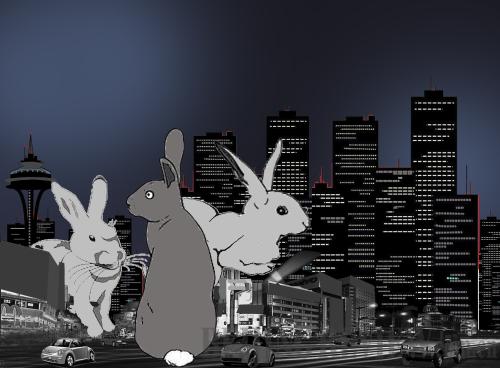|
 |
|
(LI SHIGONG) |
It is the dead of the night and the city is sleeping. A stray car cruises the street until its lonesome passenger responds in a zombie-like manner to a traffic light that turns red, stopping an invisible flow of traffic.
Down an alley the silence is numbing. Then, a toilet flushes in a nearby apartment and everything comes to life—a million pinkish eyes are opened and they sparkle like red giants. At this hour, Beijing is no longer the home of people, it is the playground of… rabbits.
The scenario might sound a bit silly but the situation is becoming serious. As the capital gets ready to enter the Year of the Rabbit, it is totally unprepared to be overrun with them.
The rabbit, in Chinese traditional culture, is strongly associated with the Moon. Anyone born in the Year of the Rabbit is expected to be articulate, talented, and ambitious, perfect examples of potential teachers, counselors and communicators. The rabbit in the Chinese zodiac is a lucky animal, so giving rabbits as presents is considered extremely positive.
The problem with the rabbit is that of the 12 animals of the Chinese zodiac, only it and the dog can be both animals and pets. The rabbit is much cheaper than its canine counterpart and thought to be easier to look after, which makes it the best present of all 12 for the New Year.
This is happening right now, all across the country. I have read numerous reports in the Chinese press of rabbit sellers struggling to find sufficient quantity to meet demand. Customers are buying rabbits in their tens or even their hundreds, passing them off to bosses and relatives as symbols of luck.
The phenomenon might be short-lived, but the rabbit is not. Many people don't know that rabbits, although they are creatures of nature like the rest of us, live significantly longer when kept inside—their lifespan is almost doubled by staying in a home rather than a hutch outside, giving them an average expectancy of around seven to 12 years. Beijing is a great place for them.
So the question arises of what a boss should do with, let's say, 10 rabbits.
While the moral person might shout "look after them, of course," the realist knows that ten rabbits are just too many to handle. Even five would be an effort, so, short of passing them off to others, a new solution is needed.
Chinese culture is being deliberately altered to improve animal welfare and the dog is a perfect example of a creature with a promising future. Netizens are, for the most part, fighting back against eating dog nationwide and though it continues to be a practice of some provinces, places like Beijing are no longer greatly involved.
The rabbit, however, gets much less attention. The long-eared animal is cooked in a manner of styles and stews, but there is a particularly popular technique on offer at one restaurant in the capital—dishes of rabbit head. The idea of slicing skin from a rabbit's face, or chewing on an ear, really excites some people.
So, the rabbit is not just an animal or a pet, it is also a source of food. This is one solution.
How easy would it be to consume the family pet? Though I might not like the idea of chowing down on Flopsy and Fluffball, I certainly can't say the same for a boss who has more than their home can handle.
The other option is to set them free, so they can hop around the city. However, digging burrows in cement paths or the Beijing soil is hard and foraging for fresh vegetation near-on impossible. These animals wouldn't survive long, especially in the chilly climate, so the scenario presented at the beginning of this article is unlikely.
There is also a growing market for animal skin products in China. The "best" animal might be mink or fox, but I wonder how long it would be before a Chinese entrepreneur makes use of these "lucky" rabbits.
In the end though, their future comes down to the attitude of the individual who owns them. A colleague of mine recently said that while she thought rabbits were cute, "they are smelly and they don't live long."
I'm certain she never realized they might be smelly because they weren't being looked after well, and they weren't living long because of the same reason. Ultimately, she seemed to like the idea of a rabbit but wasn't aware of her responsibility to care for them.
So, the Year of the Rabbit is bouncing up fast and business is booming. Tonight though, as you drift asleep and the city goes quiet once more, listen out for the hop hop hop of a forgotten pet. Aren't they the lucky ones?
The author is British and lives in Beijing | 